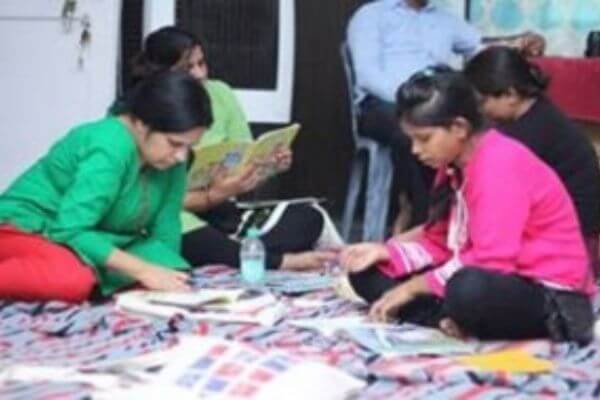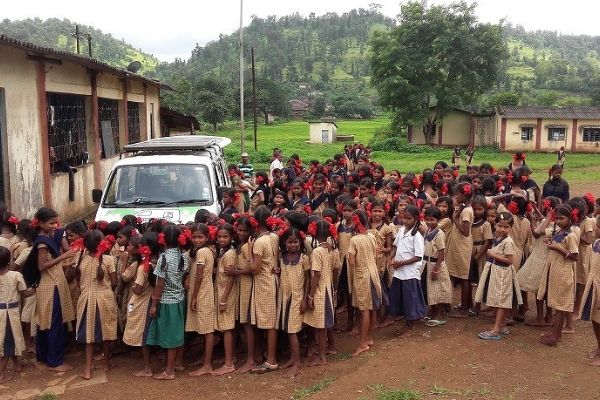
Loading...

Loading...
It was with great excitement that I participated in the second contact period of Library Educators Course (LEC) in offered by Bookworm in partnership with Parag Initiative of Tata Trusts.
In the morning, I was met by an empty hall at 11 am, and I was wondering how will the contact period unfold? I was not only excited but also a little nervous and then the Bookworm team came. They worked like a skilled and coordinated team. They arranged bookshelves, kept books, created reading spaces and a series of small activities and then the place started to look vibrant and inviting people to want to read. I could not even imagine that this whole space could be transformed in just one hour! It was this team’s skill and vision on library that could achieve this.
First day of the contact session started with welcoming participants by making beautiful Rangoli together, to create a warm and creative environment for the contact session.
An important experience from this contact period was that a good discussion relies on so many small but important things like the sequence of sessions, the harmony among hearing, sharing and asking, which actually enable us to learn collectively. Usha’s session on Emily Ford’s paper was amazing, particularly the way she linked the session with books like That Bookwoman, Clara and the Book Wagon, Biblioburro, during the activity to understand “Praxis” in the Library. Jane’s session on illustration and becoming a reader was not only thought provoking but also enabled participant to consolidate their imagination about joy of reading. I realized that reading and library is itself a domain of knowledge. These sessions compel us to think about literature viz-a-viz Children’s library and reading.
The architects of the contact period were very sensitive toward listening capacity which was explored in a session woven around listening games by Alia. These games and exercises were refreshing and fun.
The specialized and technical sessions were beautifully supplemented by social aspect around reading and library. Megha took session on “Thematic teaching in the Library”. For this, she took an example of gender discrimination and enabled the participants to read and discuss on Thejasvi Shivanand’s paper. Through group discussion she showed that the main characters of children’s books are males, but she also emphasized that there are many such books that break this hegemony of male characters or their depictions. She linked the session with children’s books and enabled LEC participants to read and understand gender perspective in select books. It was my first experience to know library and reading through a gender perspective. It was a very interactive and reflective session. I must say that the collection of books of gender themes was carefully curated and supported the session in important ways.
Though the main focus of session was gender, but for me it was amazing to know how bookmarking not only facilitates the reader but it also motivates readers to be pulled into a new theme. Through group work, importance of making bookmarks with some critical reflection was brought out.
Sujata had explained the vision and background of library at all time with a focus on the effect and experiences of library during the war. The discussion on war and linking the session with children’s books was a great way to enable the participants to understand the role of libraries in a larger socio- political sense. During the past few decades, historians have choosen variety of sources to interpret and reconstruct past, in this session we were able to understand past through selected children’s storybooks. She provided selected children’s story to participants. The selection of reading was impeccable, which was visible during the discussion of session. We felt a unique and untouched page of history that is about “library as a free space – a haven – our hope”.
There was another technical session by Sujata on Library assessment. This session got a new and constructive perspective on library evaluation. The session focused on a lot of practical aspect for smooth functioning of library, which included developing indicators and tools for assessment.
The contact period was a good demonstration of how learning can happen with fun. The session on drama where participants were acting out Sujata and Usha and trying to answer the questions on Libraries in the way they do was wonderful and full of fun.
On a personal note I think there are a lot of things that one can learn from all the sessions.
Along with a variety of books there were a lot of things displayed, particularly the display on “rain” and “handmade books” was really nice and reflective. The idea of “paper drops” was special, where each participant wrote their name on the paper drop and hung it on a display – making the display not just beautiful but interactive.
It’s not just a playful phrase, but in fact, I want to say that visiting Bookworm library, as part of the exposure visit, not only supplemented the learning during the sessions, but it was a complete experience in itself.

We just winded up the second contact classes of the 3rd batch of Library Educator’s Course and one thing that stayed with me this time was the ‘need to talk’ about literature…

Written by Pramod Kamble पुस्तकगाडी (फिरते ग्रंथालय) हा प्रकल्प आदिवासी विकास विभाग व क्वॉलीटी एज्यूकेशन सपोर्ट ट्रस्ट यांच्या सहकार्याने पालघर जिल्ह्यातील दहा आश्रम शाळांमध्ये राबवविला जातो…